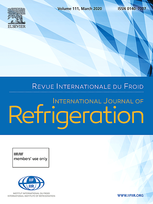
IIR document
Experimental study of ammonia flow boiling in a vertical tube bundle: Part 1 – Enhanced dimple tube.
Author(s) : ABBAS A., AYUB Z. H., ISMAIL T., AYUB A. H., LI W., KHAN T. S., RIBATSKI G.
Type of article: IJR article
Summary
This paper presents the experimental results of saturated two-phase flow ammonia in a vertical shell and tube heat exchanger comprising of seven dimpled enhanced tubes. The tests were conducted for a wide range of parameters. The heat load was provided by hot ethylene glycol/water solution flowing on the shell side. Saturation temperature of ammonia was -20°C ≤ ≤ 2°C, heat flux range 5 kW m−2 ≤ ≤ 45 kW m−2, exit vapor quality range 0.1 ≤ x ≤ 0.9 and a mass flux range of 34.99 kg m−2 s−1 ≤ G ≤ 66.32 kg m−2 s−1. For each saturation temperature, the effects of heat flux and mass flux were studied for the saturated temperature range while the exit vapor quality at each mass flux was varied between 0.2 and 0.9. Two phase heat transfer coefficient increased with saturation temperature and heat flux. For all experimental conditions, performance showed initial increase and then a classic drop at the onset of dry out. The dimple tube showed better heat transfer coefficient compared to the previous studies performed on plain tubes with ammonia.
Available documents
Format PDF
Pages: 286-299
Available
Public price
20 €
Member price*
Free
* Best rate depending on membership category (see the detailed benefits of individual and corporate memberships).
Details
- Original title: Experimental study of ammonia flow boiling in a vertical tube bundle: Part 1 – Enhanced dimple tube.
- Record ID : 30029136
- Languages: English
- Subject: HFCs alternatives
- Source: International Journal of Refrigeration - Revue Internationale du Froid - vol. 131
- Publication date: 2021/11
- DOI: http://dx.doi.org/10.1016/j.ijrefrig.2021.07.012
- Document available for consultation in the library of the IIR headquarters only.
Links
- See also: Experimental study of ammonia flow boiling in a vertical tube bundle: Part 3 – Enhanced dimple tube with 2/3rd height solid round PVC nonconductive rod.
Experimental study of ammonia flow boiling in a vertical tube bundle: Part 4 – Comparative analysis - See translations: Experimental study of ammonia flow boiling in a vertical tube bundle: Part 2 – Enhanced dimple tube with full length solid round PVC nonconductive rod.
See other articles in this issue (95)
See the source
-
Experimental study of ammonia flow boiling in a...
- Author(s) : AYUB Z., ABBAS A., ISMAIL T., AYUB A., LI W., KHAN T. S.
- Date : 2021/11
- Languages : English
- Source: International Journal of Refrigeration - Revue Internationale du Froid - vol. 131
- Formats : PDF
View record
-
Two-phase flow condensation heat transfer chara...
- Author(s) : SOLANKI A. K., KUMAR R.
- Date : 2019/11
- Languages : English
- Source: International Journal of Refrigeration - Revue Internationale du Froid - vol. 107
- Formats : PDF
View record
-
A two-dimensional model of the kettle reboiler ...
- Author(s) : PEZO M., STEVANOVIC V. D., STEVANOVIC Z.
- Date : 2006/04
- Languages : English
- Source: International Journal of Heat and Mass Transfer - vol. 49 - n. 7-8
View record
-
Experimental investigation on two-phase flow pa...
- Author(s) : GAO Y., FENG Y., ZHANG H., SHAO S., TIAN C.
- Date : 2021/10
- Languages : English
- Source: International Journal of Refrigeration - Revue Internationale du Froid - vol. 130
- Formats : PDF
View record
-
Experimental and numerical investigation of two...
- Author(s) : BAMARDOUF K., MCNEIL D. A.
- Date : 2009/05
- Languages : English
- Source: Applied Thermal Engineering - vol. 29 - n. 7
View record
